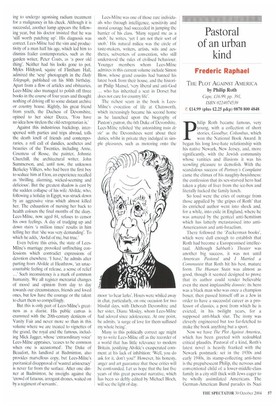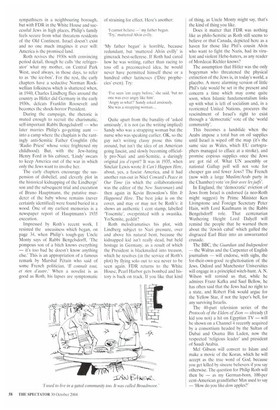Pastoral of an urban kind
Frederic Raphael
THE PLO f AGAINST AMERICA by Philip Roth Cape, £16.99, pp. 391, ISBN 0224074539 't £14.99 (plus £2.25 p&p) 0870 800 4848 philip Roth became famous, very young, with a collection of short stories, Goodbye, Columbus, which won the National Book Award. It began his long love-hate relationship with his native Newark, New Jersey, and, more significantly, with the Jewish community whose vanities and illusions it was his scowling pleasure to demolish. With the scandalous success of Portnoy's Complaint came the climax of his naughty-boyishness: the confession that its sex-starved hero had taken a plate of liver from the ice-box and literally fucked the family lunch.
So loud were the cries of outrage from those appalled by 'the gripes of Roth' that its enriched author went into shock and, for a while, into exile in England, where he was amazed by the genteel anti-Semitism which has latterly metastasised into antiAmericanism and anti-Israelism.
There followed the 'Zuckerman books', which were dull enough to establish that Roth had become a Europeanised intellectual. Although Sabbath's Theater was another big success, it was not until American Pastoral and I Married a Communist that Roth hit his best, mature form. The Human Stain was almost as good, though it seemed designed to prove that its author could render believable even the most implausible donnee: its hero was a black man who was once a champion boxer, then passed himself off as a Jew in order to have a successful career as a professor of classics, a post from which he is evicted, in his twilight years, for a supposed anti-black slur. The irony was cleverly engineered but too far-fetched to make the book anything but a sport.
Now we have The Plot Against America, which has been greeted with redoubled critical plaudits. Pastoral of a kind, Roth's latest novel is heavily franked with the Newark postmark: set in the 1930s and early 1940s, its stamp-collecting anti-hero is the prepubescent Philip, the nervous and conventional child of a lower-middle-class family in a city still thick with Jews eager to be wholly assimilated Americans. The German-American Bond parades its Nazi sympathisers in a neighbouring borough, but with FDR in the White House and successful Jews in high places, Philip's family feels secure from what threatens residents of the Old Continent. Israel doesn't exist and no one much imagines it ever will: America is the promised land.
Roth revives the 1930s with convincing period detail, though he calls the refrigerator' what my mother, on Central Park West, used always, in those days, to refer to as 'the ice-box'. For the rest, the early chapters have a seductive Norman Rockwellian folksiness which is shattered when, in 1940, Charles Lindberg flies around the country as Hitler did Germany in the early 1930s, defeats Franklin Roosevelt and becomes the shock-horror President.
During the campaign, the rhetoric is muted enough to recruit the charismatic, self-important Rabbi Bengelsdorff — who later marries Philip's go-getting aunt into a camp where the chaplain is the rantingly anti-Semitic Father Coughlin (the 'Radio Priest' whose voice frightened my childhood). But, with the Jew-hating Henry Ford in his cabinet, 'Lindy' swears to keep America out of the war in which only the Jews want to involve her.
The early chapters encourage the suspension of disbelief, and cleverly plot in the historical kidnapping of the Lindbergs' son and the subsequent trial and execution of Bruno Hauptmann, the putative murderer of the baby whose remains (never certainly identified) were found buried in a wood. One of my earliest memories is a newspaper report of Hauptmann's 1935 execution.
Impressed by Roth's recent work, I resisted the uneasiness which began, on page 34, when Philip's tough-guy Uncle Monty says of Rabbi Bengelsdorff, 'The pompous son of a bitch knows everything — it's too bad he doesn't know anything else.' This is an appropriation of a famous remark by Marshal Petain who said of some French politician, 'Ii canna,' tout, et rien d'autre.' When a novelist is as good as Roth, his lapses are symptomatic 'My father began' is horrible, because redundant, but 'muttered Alvin evilly' is gimcrack best-sellerese. If Roth had cared how he was writing, rather than racing to toss off a preconceived idea, he would never have permitted himself these or a hundred other lazinesses (Dire prophecies' even). Try:
'I've seen 'em angry before,' she said, 'but no one was ever angry like him'.
'Angry as what?' Sandy asked anxiously.
She was a strapping woman...
Quite apart from the banality of 'asked anxiously', it is not (as the writing implied) Sandy who was a strapping woman but the nurse who was speaking earlier. OK, so the guy isn't writing classy prose this time around, but isn't the idea of an American going fascist, and slowly becoming officially pro-Nazi and anti-Semitic, a daringly original jeu d'esprit? It was in 1935, when Sinclair Lewis wrote It Can't Happen Here, about, yes, a fascist America, and it had another run-out in Wel Coward's Peace in Our Time (in which the collaborationist was the editor of the New Statesman) and then again in Kevin Brownlow's film It Happened Here. The best joke is on the cover, and may or may not be Roth's: it shows an authentic 1 cent stamp, labelled 'Yosemite', overprinted with a swastika. Yo/Semite, geddit?
Roth melodramatises his plot, with Lindberg subject to Nazi pressure, over and above his natural bent, because the kidnapped kid isn't really dead, but held hostage in Germany, as a result of which the President is blackmailed into treason, which he resolves (in the service of Roth's plot) by flying solo out to sea never to be seen again. FDR returns to the White House, Pearl Harbor gets bombed and history is back on track. If you like that kind of thing, as Uncle Monty might say, that's the kind of thing you like.
Does it matter that FDR was nothing like as philo-Semitic as Roth still seems to believe or that Canada, depicted here as a haven for those like Phil's cousin Alvin who want to fight the Nazis, had its virulent and violent Hebe-haters, as any reader of Mordecai Richter knows?
The assumption that Hitler was the only bogeyman who threatened the physical extinction of the Jews is, in today's world, a placebo. A more alarming version of little Phil's tale would be set in the present and concern a time which may come quite soon, when Islamic fundamentalism links up with what is left of socialism and, in a reoriented United Nations, procures the rescindment of Israel's right to exist through a 'democratic' vote of the 'world community'.
This becomes a landslide when the Arabs impose a total ban on oil supplies until Israel is wiped off the map (it's the same size as Wales, which EU cartographers managed to efface at a stroke), and promise copious supplies once the Jews are got rid of. What UN assembly or national Gallup poll will not vote for cheaper gas and fewer Jews? The French (now with a large Muslim/Arab party in the Chamber) vote `ert finir avec les juifs'.
In England, the 'democratic' eviction of Jews from Israel is endorsed (a neo-Roth might suggest) by Prime Minister Ken Livingstone and Foreign Secretary Peter Hain, with Lord Kaufmann in the Rabbi Bengelsdorff role. That centenarian Wuthering Height Lord Dalyell will remind the people that he warned them about the 'Jewish cabal' which gulled the disgraced Earl Blair into an unwarranted crusade.
The BBC, the Guardian and Independent — the Walrus and the Carpenter of English journalism — will endorse, with sighs, the for-their-own-good re-ghettoisation of the Jews. Oxford and Manchester Universities will engage in a principled witch-hunt. A. N. Wilson will remind us that, while he admires Franz Kafka and Saul Bellow, he has often said that the Jews had no right to a state, and Robert Fisk would argue for the Yellow Star, if not the leper's bell, for any surviving Israelis.
The 40-part television series of the Protocols of the Elders of Zion — already (1 kid you not) a hit on Egyptian TV — will be shown on a Channel 4 recently acquired by a consortium headed by the Sultan of Dubai and Osama Bin Laden, now the respected 'religious leader' and president of Saudi Arabia.
Mel Gibson will convert to Islam and make a movie of the Koran, which he will accept as the true word of God, because you get killed by sincere believers if you say otherwise. The question for Philip Roth will then be — as my German-born, 100-per cent-American grandfather Max used to say — 'How do you like dem apples?'



















































































































 Previous page
Previous page